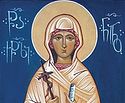

| Previous day | Next day |
| Old Style
January 14
|
Friday |
New Style
January 27
|
|
33rd Week after Pentecost.
Tone 7.
Fast Day. |
Fish, wine and oil allowed.
|
![]() Apodosis of the Theophany.
Apodosis of the Theophany. ![]() The Holy Fathers slain at Sinai and Raithu: Isaiah, Sabbas, Moses and his disciple Moses, Jeremiah, Paul, Adam, Sergius, Domnus, Proclus, Hypatius, Isaac, Macarius, Mark, Benjamin, Eusebius, Elias, and others (4th c.-5th c.).
The Holy Fathers slain at Sinai and Raithu: Isaiah, Sabbas, Moses and his disciple Moses, Jeremiah, Paul, Adam, Sergius, Domnus, Proclus, Hypatius, Isaac, Macarius, Mark, Benjamin, Eusebius, Elias, and others (4th c.-5th c.). ![]() St. Nina (Nino), Equal-to-the-Apostles, enlightener of Georgia (335).
St. Nina (Nino), Equal-to-the-Apostles, enlightener of Georgia (335).
St. Joseph Analytinus of Raithu Monastery (4th c.). St. Theodulus, son of St. Nilus of Sinai (5th c.). St. Stephen, abbot of Chenolakkos Monastery near Chalcedon (8th c.). St. Acacius, bishop of Tver (1567). St. Meletius, bishop of Ryazan, missionary to Yakutia (1900).
New Hiero-confessor John (Kevroletin), hieroschemamonk, of Verkhoturye (1961). New Martyrs slain at Raithu Monastery near Kazan: hieromonks Joseph, Anthony, Barlaam, Job, and Sergius, and novice Peter (1930).
St. Kentigern (Mungo), first bishop of Strathclyde (Glasgow), Scotland (612). St. Fulgentius, bishop of Ecija, Spain (632).
Repose of Nicholas Motovilov (1879), disciple of St. Seraphim of Sarov, and Hieromonk Cosmas, missionary to Zaire (1989).
Thoughts for Each Day of the Year
According to the Daily Church Readings from the Word of God
By St. Theophan the Recluse

Saturday. [I Cor. 14:20-25; Matt. 25:1-13]
The parable of the ten virgins is read. Saint Macarius portrays the meaning of it thus: “The five wise virgins, in sobriety, hastening toward what was unusual to their nature, taking the oil in the vessel of their heart, that is the grace of the Spirit granted from above, could enter with the Bridegroom into the heavenly bridal chamber. The other foolish virgins, remaining in their own nature, did not become sober, did not try while they were still in the flesh to take in their vessels the oil of joy, but due to carelessness or self-conceit over their own righteousness, gave themselves over as if to sleep. Because of this they were not admitted into the bridal chamber of the kingdom, and were unable to please the heavenly Bridegroom. Restrained by earthly bonds and earthly so-called love, they did not dedicate all of their love and devotion to the heavenly Bridegroom, and did not bring oil. While the souls who have sought out the sacred gift of the Spirit unusual to their nature are attached to the Lord with all of their love, walk with Him, turn away from everything, concentrate their prayers and thoughts toward Him, and are made worthy to receive the oil of heavenly grace. The souls remaining in their nature creep with their thoughts along the earth, think about the earth, and their mind dwells on the earth. They think of themselves as belonging to the Bridegroom and are adorned with justifications of the flesh; but not having received the oil of joy, they have not been reborn through the Spirit from above (Discourse 4:6).”
Friday. [I Pet. 1:1–2, 10–12; 2:6–10; Mark 12:1–12]
On the day of Theophany it is shown in action that the Divine economy of our salvation is accomplished by the Lord Jesus Christ according to the goodwill of the Father, in the communion of the Holy Spirit. But now, through the word of the Apostle, it is suggested to us that the salvation of each person according to that Divine economy of God happens in no other way than through the operation of the Most Holy Trinity: the Father, Son and Holy Spirit, According to the foreknowledge of God the Father, through sanctification of the Spirit, unto obedience and sprinkling of the blood of Jesus Christ (I Pet. 1:2). God the Father, having foreseen the man who would believe, meets him with His goodwill, and calls him to salvation through the grace of the Holy Spirit. The Holy Spirit, having called him to faith and strengthened him in it, sprinkles the believer with the blood of the Lord and Saviour in the Sacrament of Baptism. Through this, the Holy Spirit, receiving entrance into him, Himself abides in him and helps him in every way possible to provide for his salvation. Let us praise, hymn, and magnify the Most Holy Trinity, the good Maker of our salvation. Giving all diligence, let us hurry to adorn ourselves with every virtue, in the image of Him Who created and recreated us; that we not be shown to be barren nor unfruitful in the knowledge of our Lord, and bar ourselves from entrance into the everlasting kingdom of our Lord (II Pet. 1:5, 8, 11) to which we are called.
Articles
 St. Joseph Analytinus of RaithuSaint Joseph Analytinus of Raithu was a strict ascetic |
 Venerable Stephen the Abbot of Khenolakkos Monastery, Near ChalcedonSaint Stephen lived during the eighth century, and was born into a family in Cappadocia, who raised him in great piety. |










